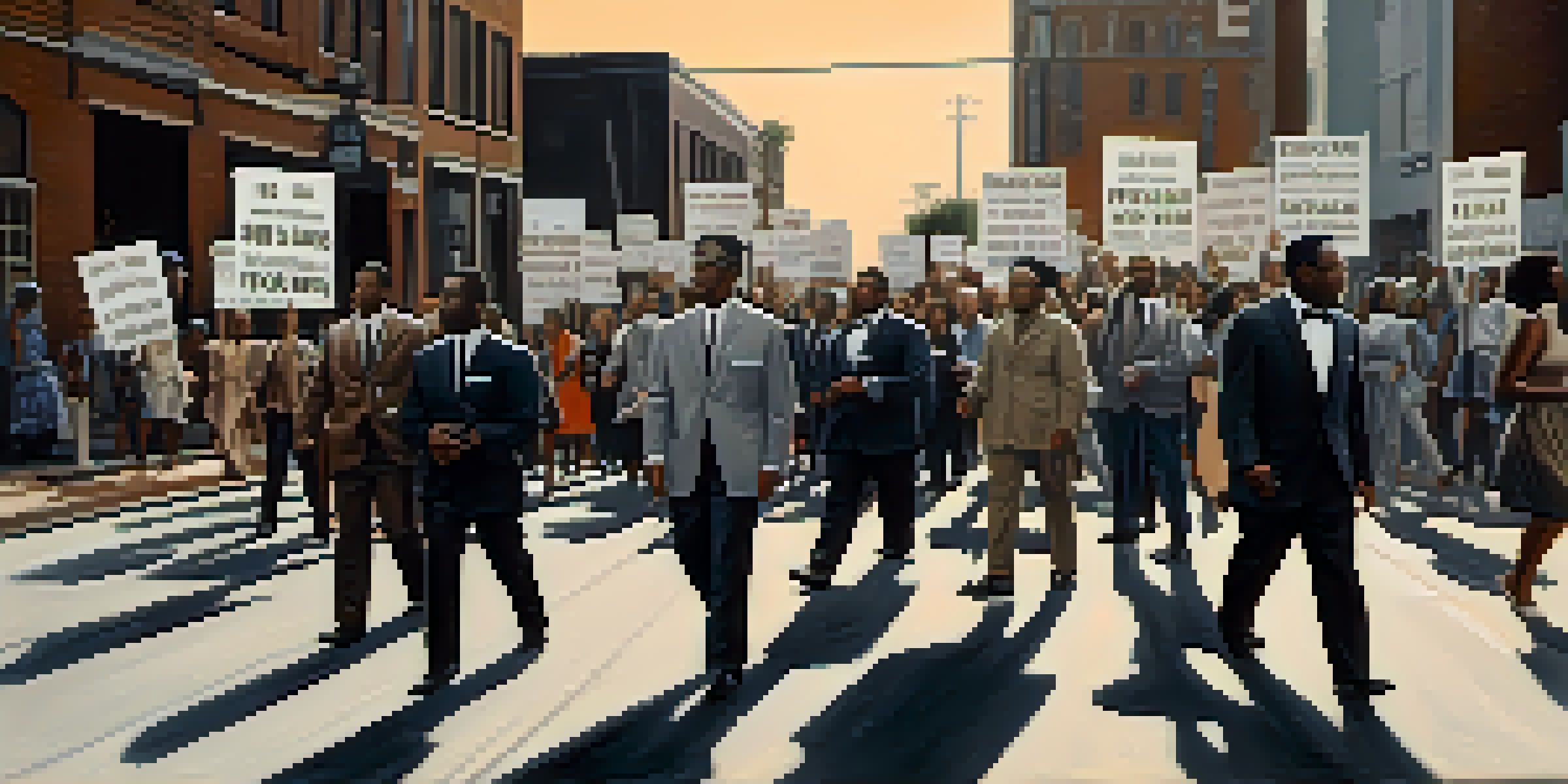Jacksonville's Role in the Civil Rights Movement

Historical Context: Jacksonville Before the Movement
Before the Civil Rights Movement gained momentum, Jacksonville was a city deeply entrenched in segregation. The racial divide was evident in schools, public spaces, and neighborhoods, creating a stark contrast between the lives of African Americans and their white counterparts.
Injustice anywhere is a threat to justice everywhere.
The Jim Crow laws that enforced racial segregation were prevalent in Jacksonville, impacting daily life. These laws not only restricted where African Americans could live and work but also limited their access to quality education and healthcare.
Understanding this historical context is crucial to appreciate the significance of the Civil Rights Movement in Jacksonville. It was against this backdrop of systemic inequality that brave individuals began to rise up and demand change.
Key Figures in Jacksonville's Civil Rights Movement
Several influential leaders emerged from Jacksonville, paving the way for civil rights activism. One notable figure was A. Philip Randolph, a labor leader who played a crucial role in advocating for African American workers' rights and social justice.

Another important personality was Dr. Mary McLeod Bethune, who founded the National Council of Negro Women. Her dedication to education and advocacy for African American women significantly influenced the movement in Jacksonville and beyond.
Jacksonville's Segregation History
Jacksonville was marked by deep racial segregation, creating significant disparities in education, healthcare, and employment for African Americans.
These leaders, among others, ignited a passion for equality and justice, inspiring countless individuals to join the fight against racial discrimination. Their efforts were instrumental in mobilizing the community and fostering a sense of solidarity.
Milestones: Key Events in Jacksonville's Civil Rights Movement
The Freedom Rides of 1961 were a significant event in Jacksonville's civil rights history, as activists traveled by bus to challenge segregation in public transportation. These rides brought national attention to the issues faced by African Americans in the South.
The time is always right to do what is right.
Another pivotal moment was the 1964 Civil Rights Act, which aimed to end segregation in public places and banned employment discrimination. Jacksonville's local leaders and citizens worked tirelessly to ensure these laws were enforced in their city.
These milestones not only showcased the determination of Jacksonville's activists but also highlighted the critical role the city played in the broader national movement for civil rights.
Grassroots Movements: Local Activism in Jacksonville
Grassroots movements were vital in Jacksonville, as local organizations rallied communities to fight for civil rights. Groups like the Jacksonville Chapter of the NAACP engaged residents to participate in peaceful protests and voter registration drives.
These local efforts created a ripple effect, empowering individuals to take a stand against injustice. The sense of community fostered by these grassroots movements helped to unify African Americans in the city during a time of widespread discrimination.
Influential Civil Rights Leaders
Key figures like A. Philip Randolph and Dr. Mary McLeod Bethune played pivotal roles in advocating for civil rights and social justice in Jacksonville.
Through relentless activism and collaboration, Jacksonville's grassroots movements not only changed local policies but also contributed to the larger national narrative of the Civil Rights Movement.
The Role of Education in Promoting Civil Rights
Education played a fundamental role in the Civil Rights Movement in Jacksonville. Schools became centers for activism, where students learned about their rights and the importance of civic engagement.
Institutions like Edward Waters College served as hubs for discussions on civil rights, empowering young leaders to advocate for change. This educational foundation was crucial in preparing the next generation for the ongoing struggle for equality.
By emphasizing the importance of education, Jacksonville’s activists laid the groundwork for future generations to continue the fight for justice and civil rights.
Legacy: Jacksonville's Impact on National Civil Rights
The efforts of Jacksonville's activists left an indelible mark on the national Civil Rights Movement. Their courage and determination inspired similar movements across the country, showcasing the power of local activism.
Many of the strategies employed in Jacksonville, such as nonviolent protests and community organizing, became blueprints for other cities grappling with racial inequality.
Ongoing Fight for Equality
Today, Jacksonville reflects on its civil rights history while actively addressing systemic issues to foster a more inclusive future.
This legacy continues to resonate today, reminding us of the ongoing fight for civil rights and the importance of community involvement in effecting change.
Challenges Faced: Resistance and Backlash
Despite the progress made, Jacksonville’s civil rights activists faced significant challenges, including violent backlash and resistance from segregationists. Many activists endured threats, arrests, and physical harm while fighting for equality.
This resistance highlighted the deep-rooted racial tensions in the city, making the struggle for civil rights even more daunting. Yet, the unwavering commitment of activists fueled their resilience, allowing them to push through adversity.

Understanding these challenges is essential to grasp the full scope of Jacksonville's civil rights history and the sacrifices made by those who sought justice.
Contemporary Reflections: Civil Rights Today in Jacksonville
Today, Jacksonville continues to reflect on its civil rights history, with ongoing discussions about racial equality and justice. Local organizations and community leaders work tirelessly to address systemic issues that persist in society.
Events commemorating civil rights milestones serve as reminders of the past and inspire current and future generations to remain vigilant in the fight for equality. This ongoing dialogue is crucial for healing and progress.
By acknowledging its history, Jacksonville can pave the way for a more inclusive future, ensuring that the lessons learned from the Civil Rights Movement continue to resonate in the community.